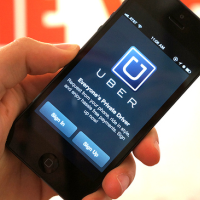S.F. and L.A. Engage in the International Pastime of Suing Uber

The counties of Los Angeles and San Francisco joined a national and international parade of litigants challenging venture capitalists' favorite startup, Uber, when they filed a civil suit over “unlawful business practices.”
The consumer protection lawsuit accuses Uber of failing to do proper background checks on drivers, illegally operating at airports throughout California, charging passengers a $4 airport fee despite not paying for the privilege and using a method of calculating trip length not approved by the government.
So far this week, Uber has been in the news because of legal problems in New Delhi, India, Toronto, Canada, Thailand, Spain, the Netherlands and Portland, Oregon. Spain and Thailand ordered the company to cease operations for different reasons. Spain is waiting for a lawsuit to be settled and Thailand wants the drivers to have registrations and insurance. New Delhi officials cracked down after a driver was accused of rape. A Dutch court said drivers needed licenses. A German court shut Uber down in September. France might close them up on Friday.
The wide range of problems is essentially generated by the company’s business plan that does not conform to conventional standards and norms of the transportation industry. Uber claims it doesn’t have to conform because it is a technology platform operating through a ride-sharing app; it is not a transportation company.
So far, that view has failed to gain legal traction. But governments are negotiating with Uber and other companies like it, because they are wildly popular and, in the case of Uber, unbelievably wealthy. The company has grown from a San Francisco startup in 2010 to a $40-billion behemoth thanks to an angel’s list of deep-pocket investors.
Uber raised $1.2 billion from six investors, including Google Ventures, Fidelity Investments and Wellington Management, in June alone.
The company has defied the claims of regulatory authority by government officials but negotiated deals that keep them in the game while money pours in. Los Angeles and San Francisco D.A.s warned Uber, Lyft and SideCar in September that they were falsely advertising the security measures taken to vet drivers and shouldn’t be hanging out at airports. They threatened to sue and Lyft settled.
San Francisco District Attorney George Gascón told Forbes that Uber background checks are “completely worthless” because the third-party hired to check out the drivers doesn't look at fingerprints. The lawsuit contains pics of Uber ads guaranteeing the “Safest Rides on the Road” with “Background Checks You Can Trust” as evidence the company was misleading the public with false ads.
Lousy background checks are part of broader allegations that the new form of ride-sharing fails to spend money on the safety features and services that regulators require of its chief competition, the moribund taxi industry. The innovative technology platforms have also tried to skirt a lot of the overhead that encumbers brick-and-mortar companies, including pesky fees and taxes, insurance and fair employee compensation.
California Public Utilities Commission (PUC) regulations prohibit the so-called ride-sharing services from actually providing the kind of shuttle ride-sharing that proliferates at airports. Uber has not been cooperative. Officers at Los Angeles International Airport (LAX) handed out 260 citations to Uber drivers during the first seven months of the year and impounded vehicles, but the lawsuit claims there were countless more violations.
Big money is banking heavily that Uber’s in-your-face negotiating style, and new ways to exploit labor and avoid government regulation will prove irresistible to politicians in a modern tech world. Speculation is that the company is preparing a final round of fund raising to boost its value before going public.
–Ken Broder
To Learn More:
2 California Counties Sue Uber, Citing Misleading Safety Practices (by Mike Isaac and Conor Dougherty, News York Times)
Uber Sued By SF and LA, Shut Down in Spain and Thailand (by Cyrus Farivar, ArsTechnica)
California Cities Sue Uber for Misleading Customers about Driver Background Checks (by Adi Robertson, The Verge)
San Francisco, Los Angeles Prosecutors Sue Uber for "Unlawful" Business Practices (by Patrick Hoge, San Francisco Business Times)
L.A. and S.F. Warn “Ride-Sharing” Companies about Actually Sharing Rides (by Ken Broder, AllGov California)
State of California v. Uber Technologies (San Francisco City and County Superior Court)
- Top Stories
- Controversies
- Where is the Money Going?
- California and the Nation
- Appointments and Resignations
- Unusual News
- Latest News
- California Forbids U.S. Immigration Agents from Pretending to be Police
- California Lawmakers Urged to Strip “Self-Dealing” Tax Board of Its Duties
- Big Oil’s Grip on California
- Santa Cruz Police See Homeland Security Betrayal in Use of Gang Roundup as Cover for Immigration Raid
- Oil Companies Face Deadline to Stop Polluting California Groundwater





